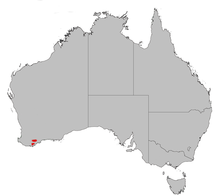| Feather-leaved banksia | |
|---|---|

| |
| inflorescences and leaves. | |
| Scientific classification | |
| Kingdom: | Plantae |
| Clade: | Tracheophytes |
| Clade: | Angiosperms |
| Clade: | Eudicots |
| Order: | Proteales |
| Family: | Proteaceae |
| Genus: | Banksia |
| Subgenus: | Banksia subg. Banksia |
| Species: | B. brownii
|
| Binomial name | |
| Banksia brownii | |

| |
| Distribution of B. brownii within Australia | |
| Synonyms[2] | |
Banksia brownii, commonly known as feather-leaved banksia or Brown's banksia,[3] is a species of shrub that grows in southwest Western Australia. A plant with fine feathery leaves and large red-brown flower spikes, it usually grows as an upright bush around two metres (6.6 ft) high, but can also occur as a small tree or a low spreading shrub. First collected in 1829 and published the following year, it is placed in Banksia subgenus Banksia, section Oncostylis, series Spicigerae. There are two genetically distinct forms.
Banksia brownii occurs naturally only in two population clusters between Albany and the Stirling Range in southwest Western Australia. In the Stirling Range it occurs among heath on rocky mountain slopes; further south it occurs among jarrah woodland in shallow nutrient-poor sand. It has been evaluated as critically endangered by the International Union for Conservation of Nature (IUCN); all major populations are threatened by Phytophthora cinnamomi dieback, a disease to which the species is highly susceptible. Other threats include loss of habitat, commercial exploitation and changes to the fire regime. Highly valued by Australia's horticultural and cut flower industries, B. brownii is widely cultivated in areas not exposed to dieback. It prefers a sheltered position in soil with good drainage, and must be provided with some moisture over summer.
- ^ Barrett, S.; Atkins, K.; George, A.; Keith, D. (2020). "Banksia brownii". IUCN Red List of Threatened Species. 2020: e.T112520669A113306481. doi:10.2305/IUCN.UK.2020-2.RLTS.T112520669A113306481.en. Retrieved 19 November 2021.
- ^ a b "Banksia brownii". Australian Plant Census. Archived from the original on 12 April 2023. Retrieved 8 April 2020.
- ^ Cite error: The named reference
SPRATwas invoked but never defined (see the help page).
